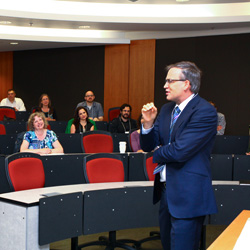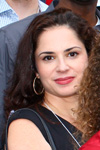Another year, another set of new faces around campus.
It’s not just the more than 2,000 first-year students who are new to Dalhousie this fall. There are also dozens of new faculty and academic staff joining the Dal ranks from all over the world. And just like new students, they have their own orientation experience.
 Last week, the Centre for Learning and Teaching hosted Dal’s 25th annual New Academic Staff Orientation, designed to introduce new professors to the resources, services and people available to help them start their academic roles here at Dal. All academic staff who have joined Dalhousie during the past year were invited to meet other new colleagues as well as discuss strategies and resources to support each other’s academic work. (Left: President Florizone drops by to chat with attendees.)
Last week, the Centre for Learning and Teaching hosted Dal’s 25th annual New Academic Staff Orientation, designed to introduce new professors to the resources, services and people available to help them start their academic roles here at Dal. All academic staff who have joined Dalhousie during the past year were invited to meet other new colleagues as well as discuss strategies and resources to support each other’s academic work. (Left: President Florizone drops by to chat with attendees.)
“I think the important thing is that we get to meet them, see who’s new, and we can connect with people right away and make them aware of what the university can do for them to support their teaching and early career success,” said Suzanne Le-May Sheffield, director for the Centre for Learning and Teaching.
Making new connections
The other important aspect of the orientation is the networking component, something Alex Quinn is grateful for. Dr. Quinn is an assistant professor in the Faculty of Medicine’s Department of Physiology and Biophysics, who specializes in heart research — specifically how the heart’s mechanical environment affects its electrical activity.
 Like many of the attendees at New Academic Staff Orientation, he is brand new to Dalhousie, having arrived in April after five years in England doing post-doctoral research at the University of Oxford and Imperial College London. With a PhD from Columbia University in New York, he originally thought he’d end up working back in the United States.
Like many of the attendees at New Academic Staff Orientation, he is brand new to Dalhousie, having arrived in April after five years in England doing post-doctoral research at the University of Oxford and Imperial College London. With a PhD from Columbia University in New York, he originally thought he’d end up working back in the United States.
“There are some places in the United States that have every toy in the world and unlimited resources, but in my search I realized what I was really looking for — what I should be looking for — was something that fit me,” he says.
So how does Dalhousie fit? Dr. Quinn says it’s the collegiality. “For me, it seems that every door is open. It’s not [just] that people are willing to help, but it seems that everyone genuinely wants to help! People go out of their way… For a young investigator, it’s amazing. To be someplace where there are big egos and it’s cutthroat, that’s not really appealing to me. And here is a place everyone genuinely wants to see me succeed.”
Mona Holmlund is another new face, joining the Department of History this fall. An art historian, Dr. Holmlund’s interests lie within the areas of popular culture and 19th-century Victorian culture.
 “They way I do art history is not the traditional approach of focusing exclusively on painting or sculpture, but rather looking at visual culture as a whole — everything from T-shirts to posters to advertising,” says Dr. Holmlund. “It’s a really interesting subject.”
“They way I do art history is not the traditional approach of focusing exclusively on painting or sculpture, but rather looking at visual culture as a whole — everything from T-shirts to posters to advertising,” says Dr. Holmlund. “It’s a really interesting subject.”
Before arriving at Dalhousie this July along with her husband, President Richard Florizone, Dr. Holmlund, who earned her history PhD from the University of Cambridge, taught half-time for seven years at the University of Saskatchewan.
Perspectives from around the world
Another new addition, and perhaps among the farthest from her previous home, is Samar El-Masri. Dr. El-Masri also has an intriguing background. After completing her education — a BA and master's at the American University of Beirut in Lebanon and then a PhD at Western University — Dr. El-Masri went back to the Middle East and taught at Prince Sultan University in Saudi Arabia for seven years in the Department of Law.
 What brought her to Dalhousie? She says Halifax was a huge draw. “It’s a beautiful place!” She also says she’s excited about the research opportunities here — and about getting into the classroom. “I have a real passion for teaching,” she says.
What brought her to Dalhousie? She says Halifax was a huge draw. “It’s a beautiful place!” She also says she’s excited about the research opportunities here — and about getting into the classroom. “I have a real passion for teaching,” she says.
Dr. El-Masri, a part-time faculty member in the Department of Political Science, specializes in international law, human rights, and, more specifically, women’s rights. “I’m looking into women’s rights in the Arab Spring,” she explains. “It’s very depressing at times to see that women are struggling to keep rights that they already were given by law, but it’s also extremely uplifting to see that the fight is far from over and that women are not giving up. It’s a great subject to study because it is affecting so many people.”
All of the new academic staff at orientation seemed genuinely appreciative of the opportunity to learn about the resources available to them, but also to meet and mingle with new colleagues — to share their experiences and stories and passions.
As Dr.El-Masri put it: “You can see even at these few tables we have people from all over the world, from all disciplines. You can’t find this anywhere else.”

